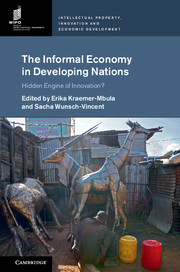Comment 2.3
Xiaolan Fu
University of Oxford
This chapter prompts us to ask whether innovation is relevant for the informal economy in developing countries.
Innovation will be low on most people’s list of priorities when they think about issues facing poorer nations, and especially when they think about the informal sector. Other concerns spring more readily to mind: food security, water, health and the prevention of conflict. Innovation may seem like a luxury by comparison, something countries can afford only once they have transcended issues of survival.
But this attitude is probably outdated. Innovation and technical progress can provide fundamental solutions to the major challenges facing low-income countries, such as poverty reduction, coping with environmental and resource constraints and sustainable development. Innovation does not have to be a luxury. Sometimes it requires neither hi-tech research labs nor expensive equipment but more small-scale, smart changes to processes and products driven by people on the ground.
Moreover, innovative capacity in low-income countries is important in increasing their inward technology transfer. Technological innovation is a key element of industrialization and catch-up in developing countries and has traditionally been concentrated in a few developed countries and among a small number of firms. Foreign sources of technology account for a large part of productivity growth in most countries, and the development process in lower-income countries can be supported by tapping into existing knowledge and know-how. Innovative capacity in low-income countries becomes critical for the successful transfer and adaptation of knowledge. Yet several constraints and obstacles prevent firms from innovating.
Nicely complementing the findings of this book, a project co-founded by the UK’s Department for International Development (DFID) and the Economic and Social Research Council (ESRC) on “The diffusion of innovation in low-income countries” (DILIC) carried out a survey of 500 formal and informal firms in Ghana in 2013 aiming to understand the form, nature and source of innovations in a low-income country (Fu et al. 2014). The survey generated the following findings:
Innovation occurs within a wide spectrum of sectors in the economy. Firms in both the formal and informal sectors in Ghana undertake relevant innovation activities, in both technological and non-technological fields.
Most research on the subject looks at the number of patents registered or R&D expenditure to see if innovation has occurred, but in lower-income countries such measures often miss the point completely. In fact – and as the authors of this chapter recognize – most innovations in low-income countries are incremental in nature, demand driven and mainly based on learning, adoption and adaptation. In other words, they are adoptions and adaptations diffused mainly within a country.
The Ghana study found numerous instances of African entrepreneurs discovering ingenious new ways to turn a profit. Their talent for remodeling old car wheels into cooking stoves, developing ways to preserve fresh mushrooms with the help of local universities, designing amazing fashions from local textiles or making delicious food products from the most humble ingredients – to name just a few examples – is much more than just a local curiosity.
Mostly innovations constitute “appropriate technology” and processes in or for the base of the development pyramid. In other words, innovation must be appropriate in its economic and technical aspects and also socially appropriate for the characteristics of a given low-income country. It thus addresses the constraints around resources, skills institutions, affordability and accessibility in the country.
Innovations in Ghana mainly originate and spread within Ghana, especially when innovation occurs in the informal economy. Some (mainly formal) firms source innovations directly from a range of foreign countries, they adapt and localize them and then those localized innovations are diffused through various business and social networks, industry associations and supply chains to the rest of the economy and the informal sector.
International knowledge is mainly acquired via imports, the Internet and multinational enterprises in the same industry, as well as by participating in export markets. Innovations originated by foreign firms are more novel than those achieved by local firms, suggesting potential knowledge and technology spillovers from the foreign entity to local actors.
The current role of universities and research institutions in innovation creation and knowledge transfer appears to be limited.
Firms have scarce knowledge of government policy instruments in place to support innovation.
In sum, the Ghana research suggests that firms in low-income countries are innovative, but also very largely unsupported. Too often in low-income countries, and in the informal economy in particular, innovations are not recognized and innovation efforts in the firms are not properly supported, for example, by mitigating financial and labor skills constraints (see also Chapter 7 of this book). New thinking and policies to recognize and support innovation are required in these countries to help support long-term growth and development.
Innovation needs to be redefined to be more relevant to the informal sector: based not so much on R&D but on the diffusion of ideas and learning. Better metrics are also required to more accurately measure innovation in this sector (see Chapter 8 of this book). A theory of how innovation is created and diffused in the informal sector should be developed, helping to create a road map to help upgrade capability in this sector. We also need to better understand the role of networks and clusters in facilitating knowledge transfer among firms in the informal sector and in building greater network-based production capacity within the sector. Finally, we need to investigate how government policies can effectively help firms in the informal sector to address resource, capability and institutional constraints, and so greatly stimulate creativity and dynamism in the informal economy.

